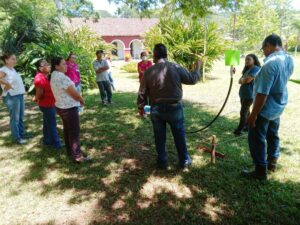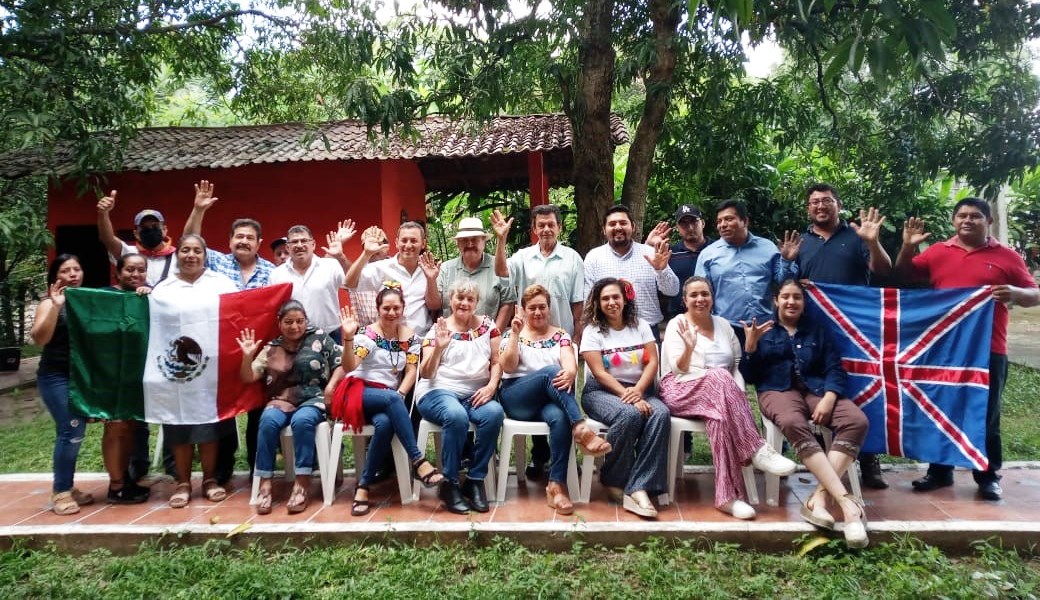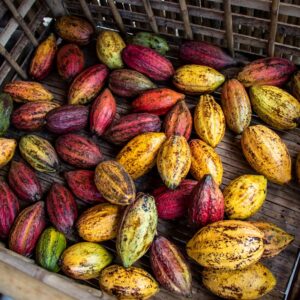The UK’s Partnering for Accelerated Climate Transitions (UK PACT) program contributes to climate restoration and resilience by providing UK expertise where it will make a big difference.
Since March 2021, UK PACT has been addressing the decline of cacao production in farming communities in the Mexican state of Tabasco, on the Gulf of Mexico.
In 2021, there were six thousand fewer hectares of cacao harvests than in 2020 in this region.
The worsening of cacao production in Tabasco is the result of several factors.
On the one hand, higher temperatures due to climate change are causing infections such as moniliasis that could kill cacao plants.
It takes careful monitoring and laborious physical care for the cacao plants to heal after they are infected, and this is difficult for some of the elder farmers.
On the other hand, the loss of ancestral knowledge about the management and care of the cacao plantations also contributes to poor harvests. For instance, records show that on average, one hectare produced 0.8 tons of cacao in 1985 whereas it produced only 0.45 tons in 2020.
Low production means less income for the harvesters to acquire equipment and make other investments required by their plantations, such as fertilizers, irrigation systems and pest control measures.
Low incomes from cacao harvests have also led many communities to opt for other more profitable economic activities such as cattle ranching and corn farming.
These activities are the main causes of deforestation in Tabasco and this is why it is important to promote the sustainable harvesting of cacao in this region.
UK PACT is helping to tackle this issue by providing training on agricultural best practice to 254 cacao farmers – including 105 women – in five different communities of Comalcalco, Tabasco. A total of 140 workshops have taken place since 2021.
The farmers have been taught a variety of topics to help them increase their production in an eco-friendly way. These include improving their production processes and methods, pest control, using organic fertilizers, transforming cacao to different foods, and upgrading their irrigation systems.
They have also received financial education to improve their business skills, as well as guidance on applying for industry certifications to better market their products.
 Two years of capacity building have empowered these communities to take special care of the flora and fauna on their plantations, as they are necessary for a healthy cacao harvest. By using new agricultural practices, the farmers are increasing their production and adding more value to their harvests.
Two years of capacity building have empowered these communities to take special care of the flora and fauna on their plantations, as they are necessary for a healthy cacao harvest. By using new agricultural practices, the farmers are increasing their production and adding more value to their harvests.
While previously they sold green cacao beans for 20 Mexican pesos a kilo (approximately £0.8) now they have learned to produce and sell fermented cacao beans which are worth 140 pesos a kilo (£6.3).
By slightly processing the green beans, the harvests have become eight times more profitable, bringing important social benefits for the communities in Tabasco, especially for women and elders.
Ana Parizot, a cacao producer, says “In our 50-hectare plantation we take care not only of the cacao tree but also the ecosystem around it. So we have a variety of different trees that help maintain the biodiversity of Tabasco while also combating climate change.”
For the next year, this partnership between the UK and Mexico will continue to strengthen the business and technical skills of the cacao-farming communities in Tabasco, improving their livelihoods and incomes while reducing deforestation in the south of Mexico.
Unless otherwise credited, all images are courtesy of UK Pact.


